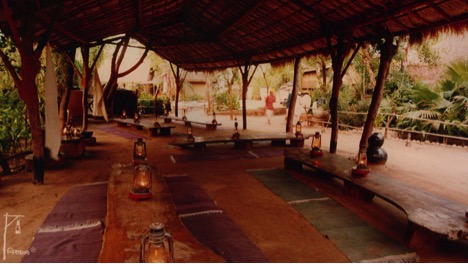In India, food is culture. This is what makes weddings memorable for eternity. In daily life, each meal is hand-cooked fresh with home-made spices. Every state of India has its own assortment of food that manifests the geography, the culture and even the physical appearance of the people. Food is also associated with spiritual purity of thoughts and sustainable habits of a person. It is a very well known saying that ‘As is the food, so is the thought.’ Hence, we can easily infer that, in India, eating food is not just a way to satisfy hunger but it is a ritual.

Vishala is such a restaurant, where we truly feel as if we have accomplished a ritual. In Sanskrit language, the term Vishala means vastness, grandeur and magnificence. Can you imagine a restaurant with no doors or enclosing walls? Vishala indeed is a place that symbolizes the real meaning of vastness. There are no physical obstructions, even in the form of doors or walls. Serene and surreal, the Vishala focuses on free mind and relaxed ambience. It is located in the city of Ahmadabad in Gujarat, India and offers homely and sumptuous food in a relaxed natural environment.
A huge tree welcomes me as I enter the rustic and bucolic space. Under the tree, settles a small statue of Lord Ganesha (Hindu God with elephant head. In Hinduism, Lord Ganesha is the God of beginnings and is honored at the start of auspicious ceremonies and rituals. He is also revered as the remover of obstacles. People keep his idol at the entrance of their homes and offices) which immediately connects me with the character of the place. A serpentine and narrow alley with lanterns lit on both sides is a treat to eyes. The restaurant has a beautiful and only museum of its kind in the world displaying a precious collection of old utensils. They speak of the unmatched art and genius of mankind during the days of yore when the modern facilities were not known to people. These utensils depict how people previously lived in harmony with nature. There are a few small shops that sell local handicrafts. As the dusk settles over, I am awestruck with the glittering effulgence and refreshing breeze. The entire area, mud-plastered and with ground seating arrangements tells that it is not impossible to live in consonance with nature. I am highly amazed and impressed as I come to know that the entertainment section uses no modern sound and light systems. The restaurant gives opportunities to the local and traditional artists to exhibit their talents and make it a lively experience. The puppet shows in vibrant colors and catchy traditional music revive the culture of story-telling and instilling values in kids. The magic shows and folk dances make a prelude to the savory feast that is about to follow.
When it comes to dining, I am in awe with seating arrangement. I sit on the neat mud floor and find a low wooden plank in front of me that serves as a table of sorts. The Ayurveda (a system of medicines originated in prehistoric times in India) informs us that the best way is to sit in a cross-legged posture. This posture aids in preventing a hernia. As a direct consequence of this posture, you feel that you are full upon having your fill, whereas actually, there is still some space left in the stomach. This keeps the stomach free of the tensions that result from over-eating. I am given a plate made of leaves and, like a royal guest, I am offered delicious condiments in succession. Greens, sprouts, beans, salads, home-made butter, curries, desserts, assorted India breads, buttermilk served in earthen cups, kulfi (Indian ice-cream) and spicy dates- all unlimited! I am eating to my heart’s content.
I feel that the notion of a countryside setting is not only to allure the guests but also to bring the urban milieu closer to nature. The countryside tries to resuscitate the sustainable habits that had once been an innate part of Indian culture. The idea of making profit by generating livelihood for the local people and preserving their heritage is laudable. Vishala is an ideal example of how businesses can thrive while sustaining a healthy environment and contributing to the betterment of the society.




